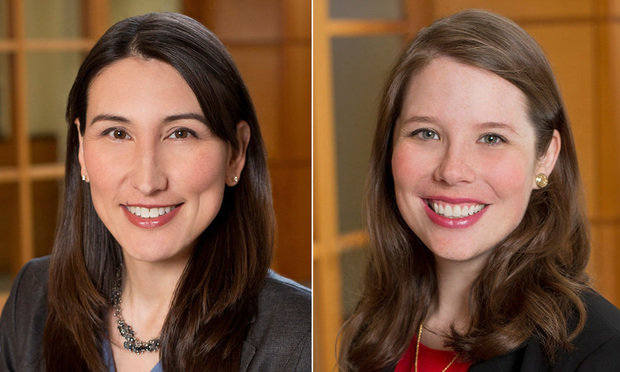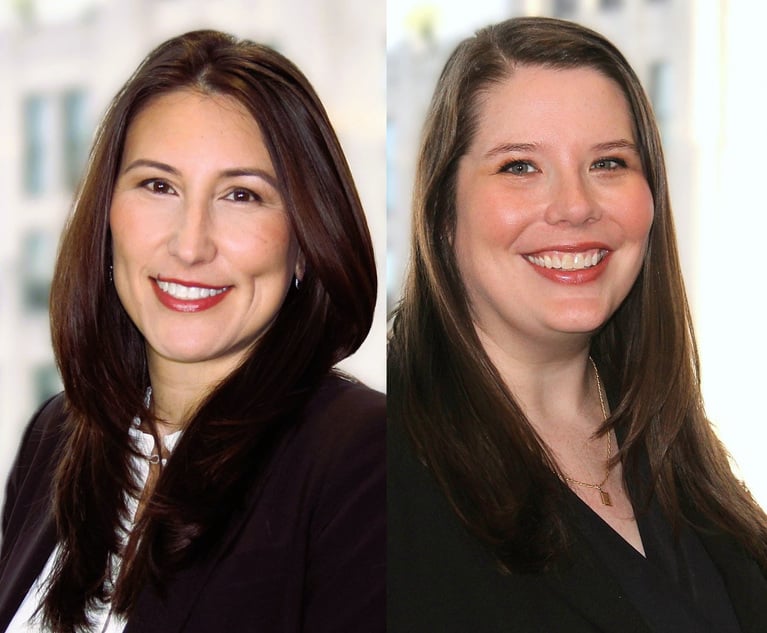Tips for Talking to the Media During Litigation
No matter the size of the client, many attorneys working on matters that may involve media requests will consider their obligations under Rule 1.4(a)(2) of the Georgia Rules of Professional Conduct, requiring an attorney to “reasonably consult with the client about the means by which the client's objectives are to be accomplished.”
April 09, 2018 at 11:52 AM
6 minute read

It is one of the great prides of our legal system that the courts are open to the public. Case materials become part of the public record so that society can be informed of developments that impact their daily world. One byproduct of an open courts system is that high-profile litigation may reach the front page of the paper or even, in some instances, create a media firestorm.
Although the public pleadings may provide significant fodder for the press, it is not uncommon for members of the media to ask attorneys to comment on their cases or the parties involved. The availability and instant access to social media can also prove tempting. Attorneys may even feel some pressure to engage in some trash-talking, however light, to provide a good sound bite.
Some litigation may be subject to gag orders or other limitations that impact what an attorney can tell the public about one of their cases. This article provides tips for attorneys seeking to balance their obligations of confidentiality with the risks of speaking to the media.
What Does the Client Want?
As with many strategic decisions impacting the representation, most attorneys working on high-profile matters will consult with their clients regarding a media strategy. The clients can provide permission or limits on how much they want their lawyers to do. Although, as noted below, the Rules of Professional Conduct provide some guidance on when an attorney is permitted to comment on an ongoing representation and what the limitations are, the client's wishes are also paramount for most attorneys.
Some corporate clients will have official guidelines that expressly preclude public statements to the media without prior consent. Other clients may even have in-house public relations teams that are solely tasked with media communication.
No matter the size of the client, however, many attorneys working on matters that may involve media requests will consider their obligations under Rule 1.4(a)(2) of the Georgia Rules of Professional Conduct, requiring an attorney to “reasonably consult with the client about the means by which the client's objectives are to be accomplished.”
Is There a Risk of Material Prejudice?
Rule 3.6(a) of the Georgia Rules of Professional Conduct prohibits an attorney from making “an extrajudicial statement that a person would reasonably believe to be disseminated by means of public communication if the lawyer knows or reasonably should know that it will have a substantial likelihood of materially prejudicing an adjudicative proceeding in the matter.”
This rule can be tricky to interpret in practice. Even the comments to the rule acknowledge that “[i]t is difficult to strike a balance between protecting the right to a fair trial and safeguarding the right of free expression.” The public may have a right to know, and a client may have a right to address public concern, but lawyers can find themselves getting in trouble for going too far.
The comments to the rule also identify circumstances regarding which public statements may be more likely to lead to prejudice. These include comments as to the character of a party to the litigation, a stated opinion as to a defendant's guilt or innocence, or disclosing information that is likely to be inadmissible as evidence in a trial.
There are other arenas that the comments recognize are considered more fair game, such as information contained within a public record, a warning of danger to the public where there is a likelihood of harm, or a statement that an investigation is ongoing. The takeaway here is that the context and content of the public statement matters.
Who Started It?
Although it is reminiscent of family squabbles, it matters in these instances “who started it.” Indeed, even if an attorney is generally prohibited from making certain statements to the press, the lawyer may make a statement that “a reasonable lawyer would believe is required to protect a client” from the harm of recent publicity initiated by someone else. Rule 3.6(c).
In those circumstances, if someone other than the client or the attorney initiated recent publicity, that attorney may then make a statement “limited to such information as is necessary to mitigate the recent adverse publicity.” Thus, attorneys may be able to make statements that would otherwise not be permitted by Rule 3.6(a) if those statements are narrowly aimed at rebuttal. This is because, as the comments to Rule 3.6 recognize, “responsive statements may have the salutary effect of lessening any resulting adverse impact on the adjudicative proceeding.”
Does Your Firm Have a Policy?
In addition to checking with the client, many attorneys facing media inquiries for their matters will discuss their options internally before making a comment. Some law firms have media policies in place or even an internal media department to help attorneys navigate the media. Separately, attorneys may find that they benefit from additional minds weighing in on the strategy and approach to media discussions to help ensure both ethical compliance and that the firm is best serving the client's needs.
Even if asked for general comment on an unrelated case, an attorney may want to discuss internally to avoid inadvertently commenting on issues that could damage or embarrass other firm clients.
Check the Rules
Each court or judge may have a standing order addressing public statements to the media. Thus, attorneys would be well-served by making sure that they are not at risk of being called to chambers over their extrajudicial statements. Further, if a course of action violates a gag or other order, the attorney may be sanctioned by the court or the bar for making public statements—even if the attorney's statements otherwise comply with the rules of professional conduct in the absence of a gag order.
Interacting with the media or posting statements on social media regarding a representation can be a minefield. By considering the relevant ethical rules, however, attorneys can take steps to best serve their clients while navigating the public interest.
Shari L. Klevens is a partner at Dentons US in Atlanta and Washington and serves on the firm's U.S. board of directors. She represents and advises lawyers and insurers on complex claims and is co-chair of Dentons' global insurance sector team.
Alanna Clair is a partner at Dentons US in Washington and focuses on professional liability and insurance defense. Shari and Alanna are co-authors of “The Lawyer's Handbook: Ethics Compliance and Claim Avoidance” and the upcoming 2019 edition of “Georgia Legal Malpractice Law.”
This content has been archived. It is available through our partners, LexisNexis® and Bloomberg Law.
To view this content, please continue to their sites.
Not a Lexis Subscriber?
Subscribe Now
Not a Bloomberg Law Subscriber?
Subscribe Now
NOT FOR REPRINT
© 2025 ALM Global, LLC, All Rights Reserved. Request academic re-use from www.copyright.com. All other uses, submit a request to [email protected]. For more information visit Asset & Logo Licensing.
You Might Like
View All

CFPB Proposes Rule to Regulate Data Brokers Selling Sensitive Information
5 minute read
Trending Stories
- 1Pa. Defense Firm Sued by Client Over Ex-Eagles Player's $43.5M Med Mal Win
- 2Losses Mount at Morris Manning, but Departing Ex-Chair Stays Bullish About His Old Firm's Future
- 3Zoom Faces Intellectual Property Suit Over AI-Based Augmented Video Conferencing
- 4Judge Grants TRO Blocking Federal Funding Freeze
- 5Bar Groups Say IOLA Settlement Protects Civil Litigants' Fund From Future 'Raids'
Who Got The Work
J. Brugh Lower of Gibbons has entered an appearance for industrial equipment supplier Devco Corporation in a pending trademark infringement lawsuit. The suit, accusing the defendant of selling knock-off Graco products, was filed Dec. 18 in New Jersey District Court by Rivkin Radler on behalf of Graco Inc. and Graco Minnesota. The case, assigned to U.S. District Judge Zahid N. Quraishi, is 3:24-cv-11294, Graco Inc. et al v. Devco Corporation.
Who Got The Work
Rebecca Maller-Stein and Kent A. Yalowitz of Arnold & Porter Kaye Scholer have entered their appearances for Hanaco Venture Capital and its executives, Lior Prosor and David Frankel, in a pending securities lawsuit. The action, filed on Dec. 24 in New York Southern District Court by Zell, Aron & Co. on behalf of Goldeneye Advisors, accuses the defendants of negligently and fraudulently managing the plaintiff's $1 million investment. The case, assigned to U.S. District Judge Vernon S. Broderick, is 1:24-cv-09918, Goldeneye Advisors, LLC v. Hanaco Venture Capital, Ltd. et al.
Who Got The Work
Attorneys from A&O Shearman has stepped in as defense counsel for Toronto-Dominion Bank and other defendants in a pending securities class action. The suit, filed Dec. 11 in New York Southern District Court by Bleichmar Fonti & Auld, accuses the defendants of concealing the bank's 'pervasive' deficiencies in regards to its compliance with the Bank Secrecy Act and the quality of its anti-money laundering controls. The case, assigned to U.S. District Judge Arun Subramanian, is 1:24-cv-09445, Gonzalez v. The Toronto-Dominion Bank et al.
Who Got The Work
Crown Castle International, a Pennsylvania company providing shared communications infrastructure, has turned to Luke D. Wolf of Gordon Rees Scully Mansukhani to fend off a pending breach-of-contract lawsuit. The court action, filed Nov. 25 in Michigan Eastern District Court by Hooper Hathaway PC on behalf of The Town Residences LLC, accuses Crown Castle of failing to transfer approximately $30,000 in utility payments from T-Mobile in breach of a roof-top lease and assignment agreement. The case, assigned to U.S. District Judge Susan K. Declercq, is 2:24-cv-13131, The Town Residences LLC v. T-Mobile US, Inc. et al.
Who Got The Work
Wilfred P. Coronato and Daniel M. Schwartz of McCarter & English have stepped in as defense counsel to Electrolux Home Products Inc. in a pending product liability lawsuit. The court action, filed Nov. 26 in New York Eastern District Court by Poulos Lopiccolo PC and Nagel Rice LLP on behalf of David Stern, alleges that the defendant's refrigerators’ drawers and shelving repeatedly break and fall apart within months after purchase. The case, assigned to U.S. District Judge Joan M. Azrack, is 2:24-cv-08204, Stern v. Electrolux Home Products, Inc.
Featured Firms
Law Offices of Gary Martin Hays & Associates, P.C.
(470) 294-1674
Law Offices of Mark E. Salomone
(857) 444-6468
Smith & Hassler
(713) 739-1250







